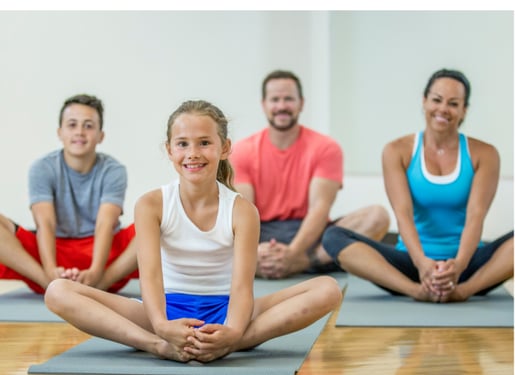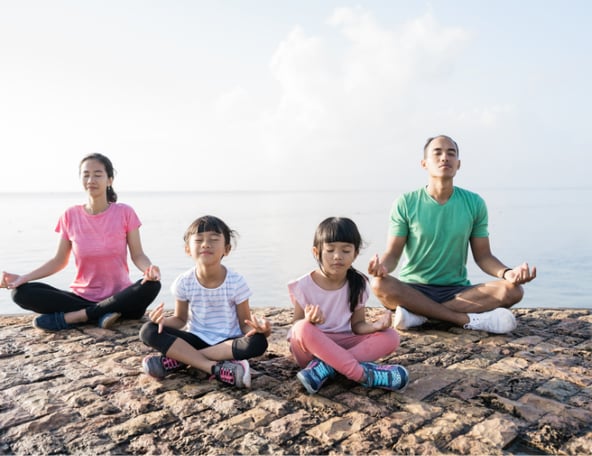Yoga and Parenthood
A Path to Balance, Patience, and Presence
11/13/20244 min read


Yoga and Parenthood
The Power of Stillness: Embracing the Present
Parenting often feels like a race against time. There’s always something to do, somewhere to be, or something to plan. But yoga teaches us the art of slowing down and finding stillness amidst the chaos.
When we practice being fully present, we notice the little things—the way our child’s eyes light up when they laugh, the warmth of their small hand in ours, the joy of simple conversations. These moments, when truly experienced, become the treasures of parenthood.
Incorporating mindful practices such as breathing exercises or short meditative pauses into your daily routine can help anchor you in the present. The more you practice, the easier it becomes to savor the fleeting beauty of your child’s early years.
INTRODUCTION
Parenthood is one of life’s most profound journeys—a blend of boundless joy, deep love, and countless challenges. It’s a role that transforms us, demanding we juggle responsibilities while nurturing our children’s growth and happiness. In this whirlwind, many parents ask, Am I truly present for these moments, or am I just going through the motions?
In today’s fast-paced world, it’s easy to lose sight of the preciousness of each moment. Between work, school schedules, extracurricular activities, and daily chores, the days often blur together, leaving little time to pause and appreciate the fleeting beauty of childhood. And yet, these moments define our lives, the memories that stay with us long after our children have grown.
Yoga offers a powerful remedy to this constant rush—a chance to reconnect with ourselves and our children, to find stillness amid the chaos, and to embrace each moment with mindfulness and grace. It’s not just a physical exercise; it’s a way of life that teaches us to be present, patient, and deeply connected to what truly matters.
Through yoga, we can slow down and cherish the small, everyday moments that make parenthood so special. Whether it’s sharing a laugh during a playful stretch, calming a tantrum with mindful breathing, or finding strength in moments of exhaustion, yoga equips us with the tools to navigate parenthood with love, resilience, and balance.
Parenting, at its heart, is a dance of connection—a journey that’s not about perfection but about presence. Yoga reminds us to be fully here for the ride, to appreciate the now, and to nurture ourselves so we can give our best to those we love most.
Let’s explore how incorporating yoga into your life can transform your parenting and the bond you share with your child, creating a foundation of love, patience, and mindfulness.
Patience Through Practice
Patience is one of the most tested virtues in parenthood. Whether it’s a toddler’s tantrum or a teenager’s rebellion, our ability to respond calmly is often challenged.
Yoga teaches us to endure discomfort with grace. Holding poses while focusing on our breath trains us to remain steady under pressure. Applying this in parenting helps us breathe through moments of frustration, understand our child’s perspective, and respond with compassion instead of anger.
Even short yoga sessions can help reset your mind and body, providing the energy and calm needed for those unpredictable parenting moments.
Self-Care: A Gift to Ourselves and Our Children
As parents, we often prioritize our family’s needs over our own, leaving little time for self-care. Yet, yoga reminds us that taking care of ourselves isn’t selfish; it’s essential. A calm, centered parent creates an environment of security, warmth, and love.
By dedicating even 10–15 minutes a day to yoga or mindfulness, you can recharge your energy, build emotional resilience, and set a powerful example for your children. They learn that self-care is a strength, not a luxury.
Heartfulness: Parenting from the Heart
Parenting is not just about managing tasks and responsibilities—it’s about building connections that come from the heart. In today’s fast-paced world, we often lead with our minds, planning and problem-solving. But true parenting happens when we listen to and act from our hearts.
Heartfulness practices like relaxation and meditation offer tools to deepen this connection. These techniques reduce stress, enhance emotional balance, and allow us to respond to our children with love and understanding.
Heartfulness Relaxation: Take a few moments to consciously release tension in your body. For example, before addressing a child’s emotional outburst, sit for a minute and relax your shoulders, neck, and mind.
Heartfulness Meditation: Spend quiet moments focusing on the heart with your child. Guide them to feel their breath and connect with their emotions, creating a foundation for emotional intelligence.
Yoga as a Family Tradition
Practicing yoga as a family can be a joyful and bonding experience. It’s a chance to laugh, relax, and connect while teaching children the importance of mindfulness and self-care.
Simple Family Yoga Ideas:
Morning Stretches: Begin the day with light, playful stretches like “cat-camel” or “downward dog.”
Balloon Breaths: Sit together, place hands on the belly, and imagine it inflating like a balloon with each inhale and deflating with each exhale.
Balance Challenges: Try poses like the “tree pose,” encouraging each other to stay steady and laugh at the wobbles.
Meditative Moments: End the day with Heartfulness and Relaxation, guiding each other to release tension and embrace calm before bedtime.
Yoga Spot: Create a family yoga corner with mats, cushions, and calming decor. Make it a space for stretching, unwinding, or simply being together.
A Journey of Growth
Integrating yoga into parenting isn’t about achieving perfection. It’s about embracing the present, nurturing balance, and building deeper connections with your children. These practices help navigate the highs and lows of parenthood with grace, love, and mindfulness.
Yoga gives us the tools to parent from a place of calm and confidence, allowing us to cherish the journey while teaching our children the value of presence, patience, and self-care.






